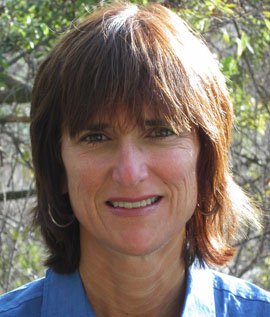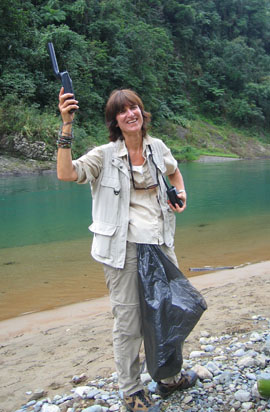For 13 years, UCSC alum Loren Steck has partnered with fellow alumni and Porter College to offer a class called "Working in TV and Film," which features working Hollywood professionals who captivate students with accounts of life in the entertainment industry.
And for 13 years, students preparing to build their own careers in the industry have responded to this glimpse of the "real world" with course evaluations like these:
. "Finally, a course that gives you heavy details and prepares you."
. "This course was extremely valuable! Every lecturer was knowledgeable."
. "I learned a lot of relevant information that I'm sure will really help me down the line. Where most classes give me a lot of theoretical knowledge, I really liked the practical focus of this one."
The class is a labor of love for Steck (B.A., independent major, Porter College, 1973), a Carmel-based consultant for television, who wants to introduce students to the concept of career networking, which is "the normal way people in the industry get work."
Offered each winter quarter, the two-unit course typically meets for two hours on Friday afternoon to accommodate the schedules of guest speakers who fly in from Southern California and elsewhere. The class attracts aspiring writers, directors, producers, cinematographers, editors, and makeup artists.
Among the eight guest lecturers this year were Screen Gems executive vice president Jim Fredrick (B.A., theater arts, Porter College, 1982), PBS producer Eric Cain (B.A., anthropology, Merrill College, 1972), and producer Marie Cantin (B.A., sociology, Stevenson College, 1973).
During a fast-paced class in late February, Cantin gave students an overview of her career, industry trends, and a glimpse of the future. Of all the industry's job titles, producer is perhaps the most amorphous, explained Cantin, who works on studio and independent films, as well as the occasional television project.
"There are as many different roles for producer as there are people who do the job," said Cantin. "I get to do a lot of different things. I get to learn, make mistakes, and lead the charge. I like to do that."
Cantin, whose portfolio includes the films The Waterdance, Book of Stars, Things to Do in Denver When You're Dead, Masked and Anonymous, Save the Last Dance, Collateral, and Dante's Peak, said producers may be responsible for finding and developing material, raising money, funding projects, hiring directors, writers, cast members, and technicians, overseeing day-to-day operations on the set, and even marketing and distribution.
Cantin said she enjoys helping craft movies "from beginning to end" and that most of her knowledge has been gained on the job. But it hasn't always been easy, she cautioned.
After college, Cantin grappled with her interest in film, which wasn't an obvious fit. "I didn't grow up seeing a lot of movies. We didn't have a TV," she recalled. "I read. I read a lot."
In the end, said Cantin, the creative process comes down to what the artist wants to say. "What's your story? That to me is still the job and challenge of any artist," she reiterated after the class. "And that's where my excitement comes from. What are these people going to say, and how are they going to say it?"
Cantin said she considered law school ("I didn't want to go," she admitted), and when she finally told her father she wanted to work in movies, he said, "Move to LA." Cantin was working toward an M.F.A. in film and television production at UCLA when she landed her first job as a production assistant, so she left school and has patched together projects ever since.
Cantin didn't gloss over the financial uncertainty she has lived with as she pursues the work she enjoys, and she said this is a "very, very interesting and bizarre time in the industry. This is the slowest two years I've ever had."
Although traditional jobs are drying up, Cantin said new media is creating a "perfect storm" of opportunity. "The means to produce and distribute films is cheap, and you can figure it out yourself," she said, marveling at how much the landscape has changed during her 30-year career.
As the pendulum swings back from specialization to generalists who can write, shoot, direct, edit, and add sound effects to their own work, the challenge becomes building an audience, said Cantin, who also teaches in the graduate program of the American Film Institute. "Who sees the work? That's the conundrum, because there are so many platforms now," she said. "It's a total free for all. That's the beauty and horror of it all."
Cantin shared her guiding principles, or what she calls "my rules of engagement for my life," which include thinking outside the box, keeping a low overhead, allowing yourself 10 years to establish your career, and remembering that "today's assistant could be your boss tomorrow."
"Have faith in something other than your success, because it's not about that," she said. "It's about how you play the game. And vacations are mandatory."
As students applauded Cantin's presentation, Steck beamed, satisfied that his class had helped another group of students gear up to make the leap from college to career.
"Hollywood is very different from the inside than it appears from the outside," said Steck. "Students who want to work in the industry should know what the reality is, to decide if they really want it and to better prepare for it if they do."
After class, Cantin said she loves talking to students and being a mentor. "Helping creative people figure out what their voice is--how to listen to that voice, how to make a living and survive, and how not to lose their way--that's my legacy," she said.




